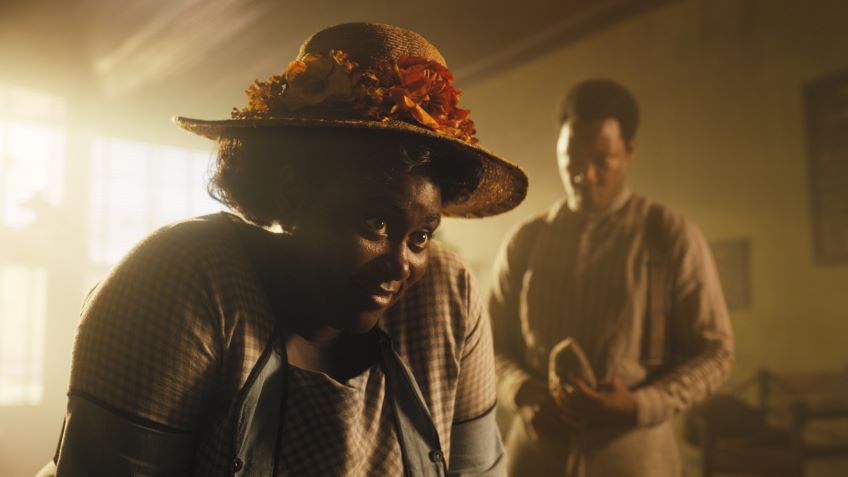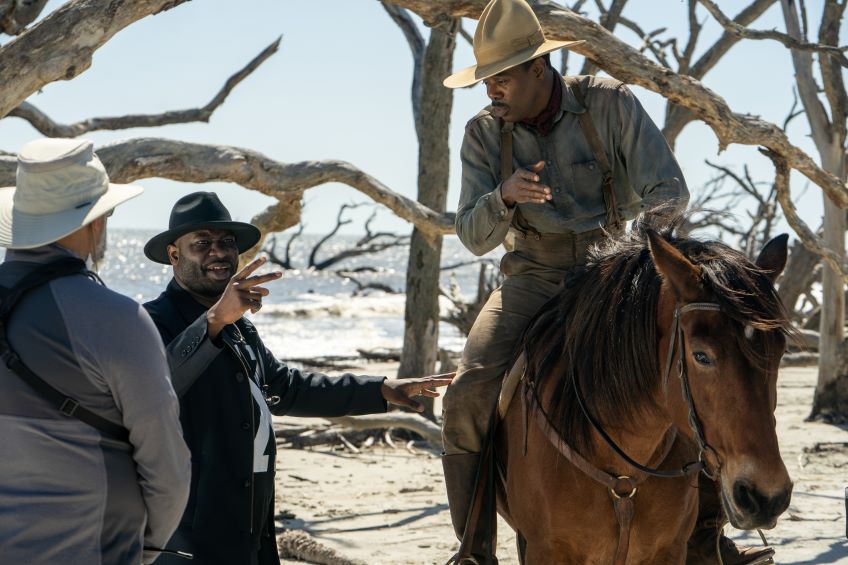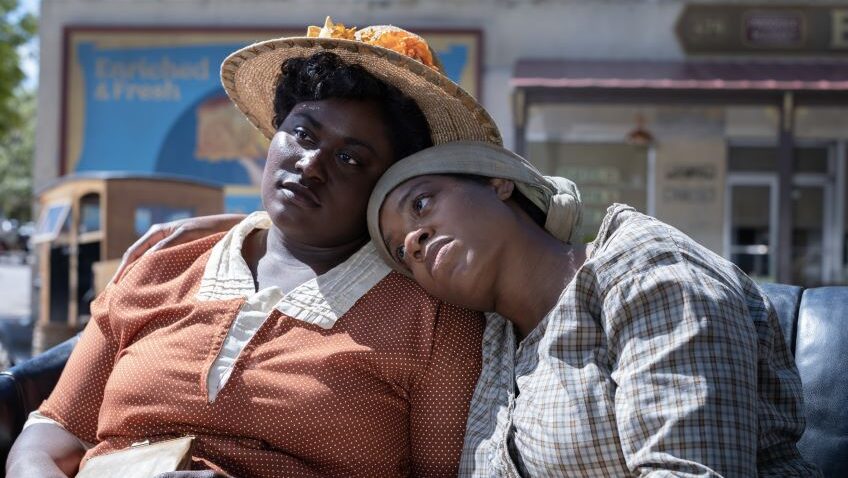Joyce Glasser reviews The Color Purple (January 26, 2024) Cert 12A, 141 mins.
Alice Walker’s 1982 Pulitzer Prize winning novel, The Color Purple is the gift that keeps on giving. To readers from secondary school and beyond it’s a ground-breaking masterpiece of African/American literature and to others, closer to Hollywood or Broadway, it’s a veritable money machine. In fact, there are so many The Color Purple’s around, it may be helpful to put Ghanaian author, visual artist, rapper, singer-songwriter, record producer and filmmaker (The Burial of Kojo) Blitz Bazawule’s new film in context.
The 1985 screen adaptation, directed by Stephen Spielberg, starred Whoopi Goldberg and Oprah Winfrey and was scored by Quincy Jones – who, now aged 90, co-produces Bazawule’s film. In 2005 came the Broadway musical and in 2015, a revival of the 2005 musical, both co-produced by Oprah Winfrey. Fantasia Barrino, who appeared as the lead character, Celie Harris-Johnson, in the Broadway musical reprises her role in Bazawule’s film.
Marcus Gardley’s screenplay is based on both the musicals and the novel, but in a nod to the 1985 film, Whoopi Goldberg has a cameo as the midwife delivering her former character Celie Harris-Johson’s first baby, Adam.
Bazawule’s film appeals thanks to the talented cast, a rousing #MeToo movement message, strong characters (Alice Walker is a self-confessed “Womanist”) and a protracted feel-good ending. But ultimately, although the film is faithful to the novel (whole lines are dialogue lifted from it) the film suffers in comparison.

A major challenge for those tackling the source novel is that it is an epistolary sisterly love story. The African-American children (Phylicia Pearl Mpasi as young Celie and Halle Bailey as young Nettie), were born into abuse and misery at the turn of the 20th century, are separated physically, but not spiritually, and lead very different lives until being reunited as middle aged-women. The only successful film from an epistolary novel I can recall is White Stillman’s hilarious 2016 Love & Friendship based on Jane Austen’s novel, Lady Susan.
The book is comprised of letters from Celie to God, written in the young woman’s pigeon-English (the word asked is spelt “ast”) with great effect. They are, of course, letters to herself, written as a coping mechanism, and eventually, letters to Nettie. Celie’s are juxtaposed with long, informative, articulate letters from the precocious, self-taught Nettie to Celie. They are a useful narrative technique for Walker to introduce the whole African connection to the Georgian girls ignorant of their heritage.
The story is arguably one of the most harrowing but ultimately uplifting coming-of-age stories of the last fifty years. When their battered mother dies, close sisters Celie plain, withdrawn and uneducated, and Nettie Harris, pretty, precocious, and ambitious are left alone with an abusive father, Alfonso (Deon Cole). He impregnates Celie, barely a teenager, giving away both her children, Adam and Olivia, within days of their birth.
He then gives Celie away to farmer Albert “Mister” Johnson (Colman Domingo), a womanising widower with three feral children, who has designs on Nettie. Alfonso describes Celie’s attributes as if she were a work horse for sale. Alfonso takes on the role of a slave dealer selling a black child to a white plantation owner – for Mister expects Celie to cook, clean the filthy house, rear his children, work in the fields and be raped every night. Walker wants to show us that black men are just as capable as violence and misogyny toward black women as are white men.
In the novel, Nettie (as an adult, played by Ciara) discovers what her sister is going through when she runs away from her father and then Mister, both of whom attempt to rape her, and joins a missionary couple and their adopted children, Adam and Olivia, on an assignment in Africa. In letters to Celie (now Fantasia Barrino), which Mister cruelly intercepts and hides from Celie over two decades, Nettie relates her observations of Senegal and Liberia to Celie. She describes seeing the ocean for the first time, being on a ship and the slave trade that brought her ancestors to America.

Fans of the book will remember this letter, so it is odd that, for no particular reason, the filmmakers decide to set the family community “on the Georgia coast” where, of course, the girls would have seen the ocean and even ships.
But going to Africa is more of a homecoming than Nettie expected. She learns that African chiefs sold their own people into slavery, and that the girls in the village where she teaches are denied education. Their sole purpose is to become their husband’s property and sex slave. In Georgia, that is Celie’s experience, too. None of this rich interplay between the sisters’ letters makes it into the film.
Also glossed over in order to gain the coveted 12A rating, is Celie’s sexual awakening when she meets glamorous blue’s singer Shug Avery. From the age of 14, her sexual encounters have been rape. Celie is shocked when Shug tells her she enjoys having sex with Mister (Celie never even knew his real name was Albert!) and teaches Celie the joy of sex. But their relationship is deeper.
Taraji P. Henson lights up the screen as Shug, just as Shug lights up Mister’s life – and, surprisingly, Celie’s, too. Shug is Mister’s true love, and, with no regard to his wife’s feelings, he makes that known to Celie. Domingo’s performance is nuanced enough to allow us a glimpse of the once fun-loving, now broken man behind the monster. Pathetically, Celie tells Shug that when she is around, Mister doesn’t beat her as much. The women’s relationship astonishes, and ultimately transforms Mister.
Other stand out characters include Sofia, (the superb Danielle Brooks), a strong-minded Black woman who marries Mister’s son Harpo (Corey Hawkins) for love, but ultimately pays the price for being proud, strong and independent.
Henson’s terrific showstopping numbers aside, the dancing is terrific, but so rapidly shot it’s hard to appreciate. There are few memorable songs. The singers are talented, but all end up sounding the same, belting out lyrics that older viewers might find unintelligible.




